Monsters & Mommis is a five-week miniseries celebrating queer horror. It’s Halloween month, so let’s plan our costumes, get slutty, and, of course, watch some scary movies. This week, Tae-yong Kim and Kyu-dong Min’s Memento Mori (1999) starring Gyu-ri Kim, Park Yejin, and Yeong-jin Lee.
The week after I came out I went to The Strand and bought two books: Gay Berlin and Transgender Warriors. Instead of memoirs or theory, my instinct was history. It felt impossible to take on this new identity without understanding those who came before me. Maybe I felt indebted to my ancestors. Or maybe it was my way of ignoring the overwhelming present, to get lost in the past and the experiences of others.
While everyone may not go out and buy history books, this impulse is far from uncommon. As queer people, we often latch onto examples of others further along than ourselves. We obsess over those who make casual what to us feels confusing. Sometimes this happens when we’re coming out, and sometimes it happens long beforehand. It may take years for us to realize why we were so obsessed with that one friend or that one teacher or that one movie star.
I talk about the 2001 Canadian classic Lost & Delirious more than I probably should. I adore the movie for its big adolescent feelings and Léa Pool’s artful direction and Piper Perabo’s angsty hotness. But mostly I love the movie because of its perspective. Our narrator is not one of the two girls in the lesbian relationship. It’s the younger, new girl at school: Mischa Barton’s Mouse. I was shocked to discover most people do not read queerness onto Mouse viewing her as a straight girl outsider. But to me the whole movie is so obviously the beginning of her sexual awakening.
There is another movie more explicitly centered in this perspective, where a girl obsesses over her classmates’ torrid affair, as she explores her own identity. It also happens to be a horror movie. Imagine if Lost and Delirious was a well-written ghost story and you’d be describing the 1999 Korean masterpiece Memento Mori.
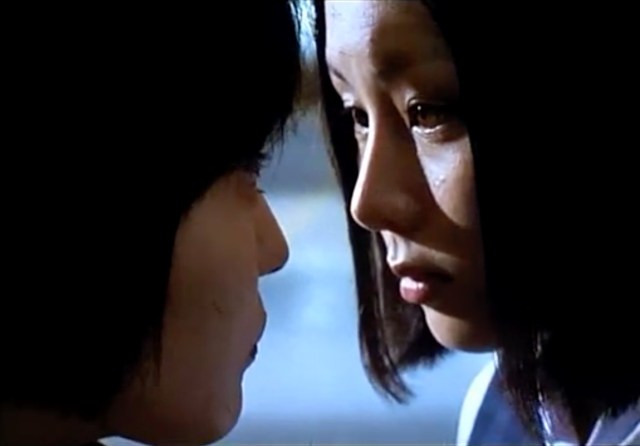
There is nothing/There is anything
Kim Tae-yong and Min Kyu-dong’s Memento Mori is technically a sequel. It’s the second entry in the five film Whispering Corridors series. But the films have little in common except their all-girls high school settings.
This film begins with Min-ah discovering a red journal. “The first kiss is like the smell of fresh apples. I’ve smelled the blood in your lips, that I’ve touched with my tongue.” Min-ah flips through and sees pictures of her classmates Hyo-shin and Shi-eun. She imagines them kissing and slams the journal shut. She leaves it on the ground.
Then she runs back and takes it.
Min-ah is rather plain. She’s friends with the popular girls, but doesn’t quite fit in with their cattiness or their boy talk, mostly centered on their teacher Mr. Goh. She does what they say and acts how they act, because this is how she can make it through the world of high school. But there’s a lack. And every time she opens the journal it’s filled.
As Min-ah reads, we witness Hyo-shin and Shi-eun’s courtship. Hyo-shin has a bob and a button nose. Shi-eun is tall and has a short haircut. Even though they’re wearing the same school uniform, they have a baby butch-femme dynamic going on.
They get caught hiding in a literal closet and are given detention where they’re tasked with scrubbing a drained pool. While Shi-eun runs around being silly, Hyo-shin cleans diligently, lost in thought. She asks Shi-eun if she wants to share a journal. They go up to the roof and cuddle. Shi-eun talks about being hard of hearing. Hyo-shin says it makes them perfect for each other because she hears things. She says she heard a bell go off the first time she saw Shi-eun. The girls laugh. They’re so darn cute.
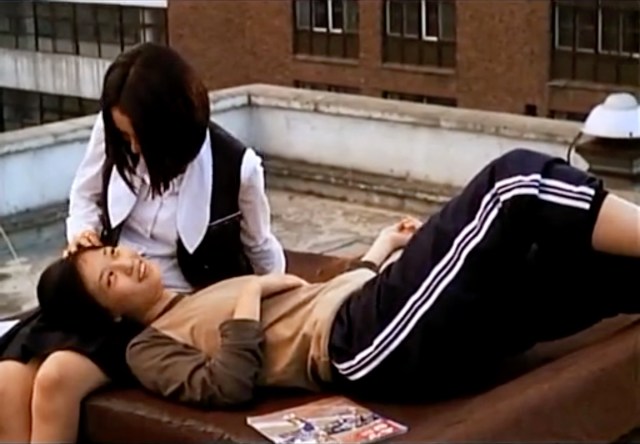
Perhaps there is/Perhaps there isn’t
This isn’t a journal from some distant time. Hyo-shin and Shi-eun are Min-ha’s current classmates. She watches them in the halls as they telepathically communicate. It’s been months since that first journal entry and one month since they’ve last spoken. 31 days and 8 hours, Hyo-shin specifies.
Min-ha doesn’t know how they communicate or how long they’ve been apart, but she can tell a shift has occurred. She keeps reading the journal, hungry for clues, eager to enter their private little world.
The girls were outsiders even before their affair was discovered. Hyo-shin was bullied for a poem she wrote for class and Shi-eun was called out by their choir teacher because of her disability. But through all of this the girls had each other.
When they meet on the roof in the present we still don’t know what changed between them. Hyo-shin mentions that she might be pregnant. She says this with a lightness adding they’ll have a baby of their own. She wishes Shi-eun a happy friendship birthday. And then she brings up suicide. The whole time Shi-eun wants to leave. She seems overwhelmed and conflicted and ready to end this interaction. But before she goes back to class she tells Hyo-shin that she misses her. Min-ha hides off to the side listening to everything.
Min-ha has class with Shi-eun and she makes a successful attempt to communicate with her telepathically. Shi-eun seems upset by this. Min-ha’s first trial at replacing Hyo-shin has failed. She cannot simply take on the journal as her own. She doesn’t know Shi-eun or Hyo-shin or their connection. She’s just an outsider, longing for something similar.
Hyo-shin is not replaceable. Not even when she jumps off the roof.
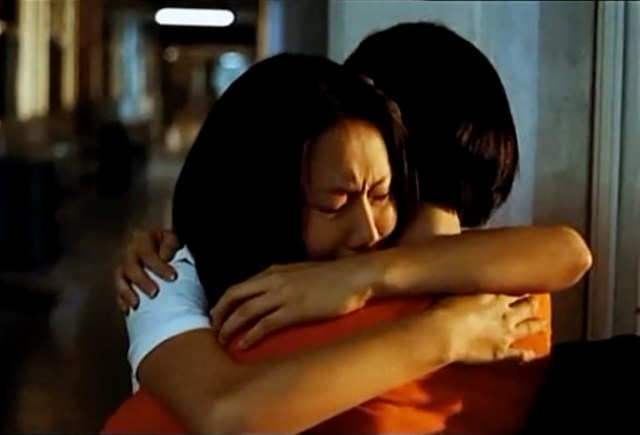
Said there isn’t/It’s not true
Driven by guilt, connection, and curiosity, Hyo-shin’s death only increases Min-ha’s interest. She keeps pressing Shi-eun to open to her. She keeps reading through the journal. Her friends start to mock her. They ask if she’s dating Shi-eun. They call her a traitor. But she doesn’t care.
Hyo-shin seems to be communicating with Min-ha. Sometimes this feels like the desperate pleas of a girl who wants justice. Sometimes it feels like the angry haunts of a girl who’s jealous. Min-ha learns that Hyo-shin and Mr. Goh were having sex. Hyo-shin presented this to Shi-eun as if it wasn’t a big deal, but it, obviously, was. Hyo-shin was a child. And she even says that she didn’t feel like she could say no. Suddenly the talk of pregnancy seems like more than a fantasy.
Min-ha reads the journal in class, and sees the words “memento mori” glued on letter by letter. She removes them revealing a translation: Remember the dead. As Min-ha reads these words, Hyo-shin’s hands begin crawling up her body. They reach under her skirt. Min-ha is panicked, unable to move. She moans something between a scream and an orgasm. And then she slams the journal shut.
Hyo-shin’s haunting of Min-ha is unique in its eroticism. The rest of the school simply gets her wrath. And they deserve it. Tired of hiding, Hyo-shin and Shi-eun decided to publicly hold hands. The other students threw things at them and called them names. Shi-eun became filled with doubts while Hyo-shin found herself more determined. She marched into Shi-eun’s classroom and began making out with her in front of everyone. For Shi-eun this was the end.
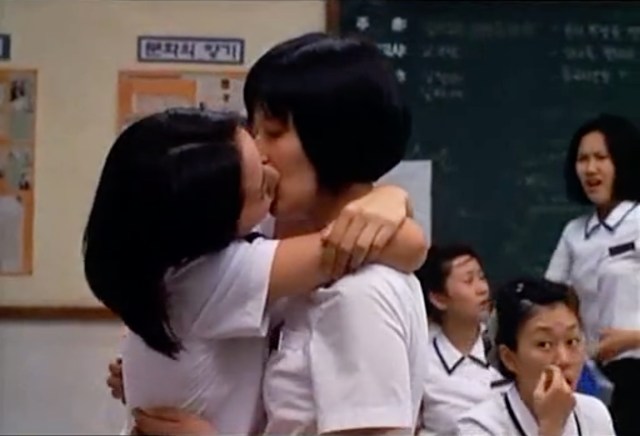
No one knows/No one cares
Hyo-shin’s ghost takes over the school. She locks everyone inside. She possesses many of the students. She throws objects around and uses the electricity as an expression of her emotions.
She kills Mr. Goh.
She remembers her breakup. She remembers telling Shi-eun she was going to kill herself and Shi-eun saying she didn’t care. She sits in this moment. We sit in this moment. And then she opens the doors and lets the school run into the rain.
Everyone is outside except Min-ah who stays lying on the ground and Shi-eun who walks slowly behind the others. Min-ah telepathically apologizes to Shi-eun for losing the journal. Shi-eun looks back with a new determination. She tells her that it’s okay. They’ll just write another one together.
The film ends with Min-ah opening the door to the roof, light rushing towards her. This fades to Hyo-shin singing “Happy Birthday” into a camcorder. And then one last memory: Shi-eun and Hyo-shin jumping around happily on the roof as the sun sets on their love.
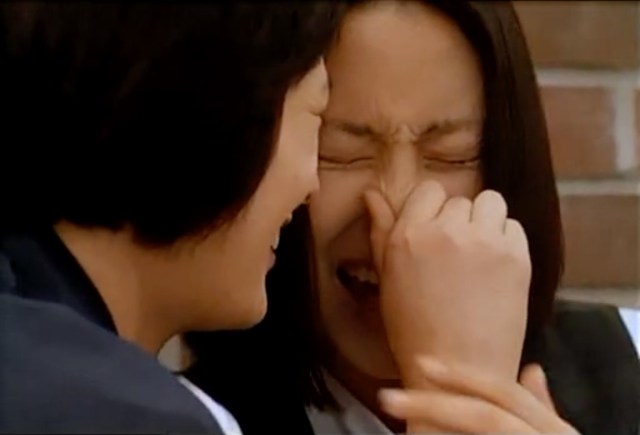
We know nothing/We know everything
When we read queer history we’re not only learning about those who came before us. When we listen to our elders we’re not only gaining wisdom. When we observe our braver peers we’re not only finding inspiration. We’re also faced with the reality that we exist because of these other people. Our experiences of queerness, as difficult as they may be, are easier, because there were others who lived before us.
There’s a certain amount of survivor’s guilt that comes with looking back. It’s easier to be Shi-eun’s second girlfriend than her first. It’s easier to be yourself when you know there are others out there like you.
Memento Mori is a devastating film, but it’s not without hope. Its very existence demands hope. It was one of Korea’s first explicitly queer films. And while one of its queer characters commits suicide, this is never framed as a punishment for her behavior. It doesn’t even arrive at the end as a cheap conclusion to the plot. It happens a third of the way into the film, giving the characters time to grieve and grow, and Hyo-shin’s ghost time to find peace.
Hyo-shin was a model for Min-ah. And all three girls got to be a model for countless queer teens. Whispering Corridors is one of the most popular Korean horror films of all time, and here was this sequel, seen by so many, teaching a lesson in queerness. I hope kids saw the beauty in Hyo-shin’s feelings. I hope they felt the ache in her loss. I hope they saw in Min-ah and Shi-eun a way forward. I hope they learned to love themselves.
This is a ghost story. This is a horror movie. This is two decades of queer lives free to live. May we all keep writing in our shared journal, telling our stories for those who need it most.
And may we all remember the dead.
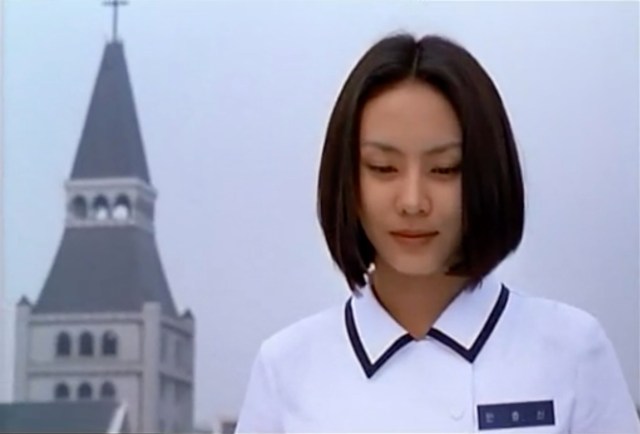
Everybody is me/I am everybody/Like the truth becomes a lie ~ Hyo-shin’s poem

“Imagine if Lost and Delirious was a well-written ghost story” sign me the fuck UP!!!!!!
This was always one of my favorite lesbian films. I never lumped it in as a favorite “Asian horror” film, because, despite the haunting, it never felt scary as much as it did desperately sad. I always liked that it didn’t end tidily, instead forcing the characters to deal openly with what they lost.
“Wishing Stairs” is another entry in this series that always felt very gay to me, although the girls aren’t in an explicit relationship–they’re best friends, but there’s definitely a raging case of first love on one of their parts.
We watched Whispering Corridors in an Asian horror cinema class, and of all the films we watched, Whispering Corridors was the one that hit me the hardest. It wasn’t the scariest or spookiest or goriest, but it was maybe the most haunting. There was something too real and too visceral about its pain that struck me (and my partner) really unexpectedly. It was just devastating. I think we left and sobbed outside and sat in the building stairwell instead of returning to class.
Different film, but “desperately sad” is a good way of putting it.
Linguistic input: “Memento mori” doesn’t mean “Remember the dead”, it translates to “Remember you will die”.
Besides that, very interesting article!